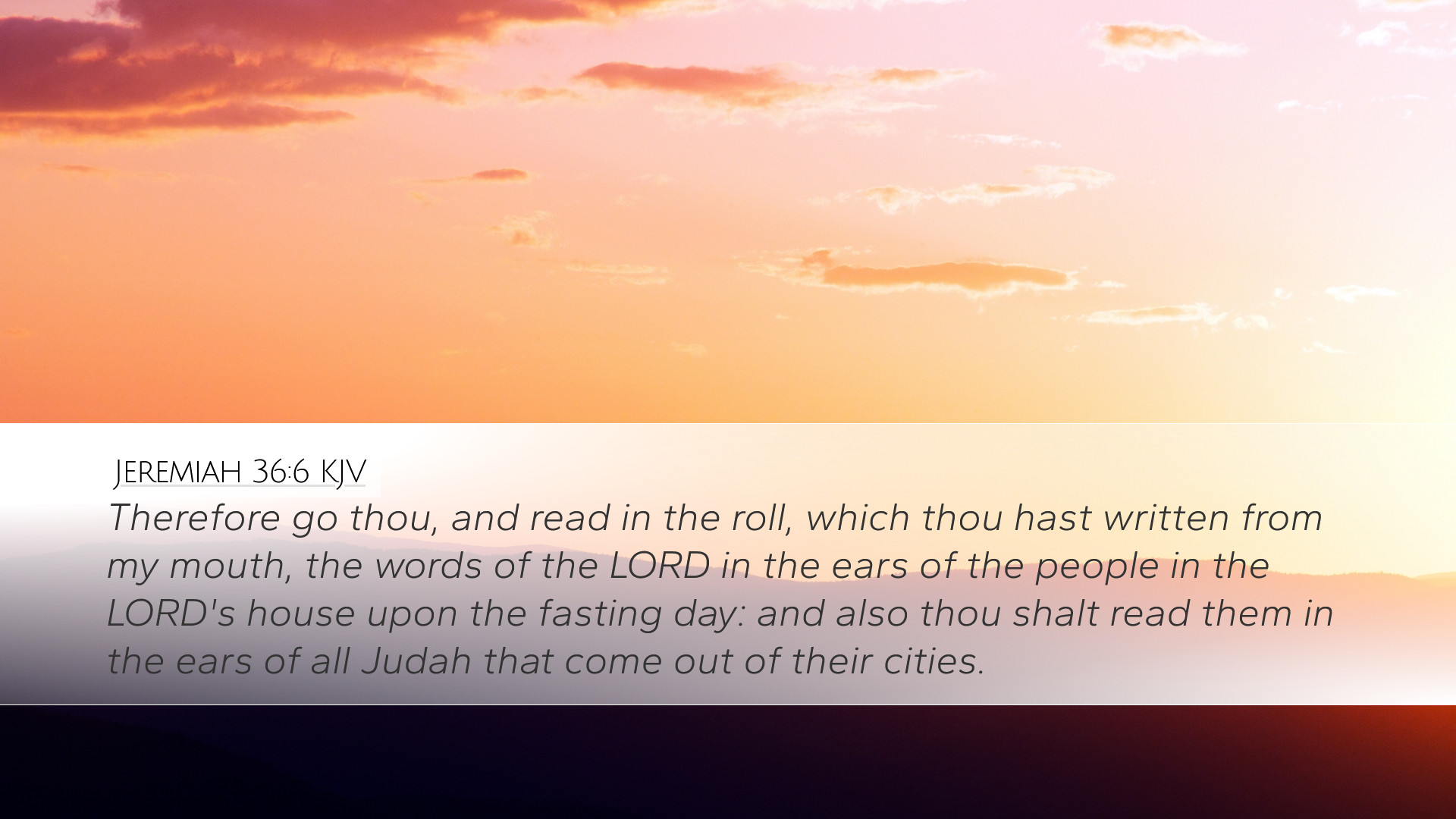Commentary on Jeremiah 36:6
Verse: “Therefore go thou, and read in the roll, which thou hast written from my mouth, the words of the Lord in the ears of the people in the Lord’s house upon the fasting day: and also thou shalt read them in the ears of all Judah that come out of their cities.”
Contextual Overview
This verse is situated within a significant prophetic narrative where God commands Jeremiah to communicate His words to the people of Judah during a time of national crisis. The background involves the Babylonian invasion and the moral decay of the people, making this message both urgent and pivotal.
The Divine Command
Matthew Henry emphasizes that the command to Jeremiah highlights the necessity of faithfully declaring God's word. It showcases God’s intent to reach out to His people and gives them an opportunity for repentance. The phrase "which thou hast written from my mouth" reinforces the divine authorship of the message and the importance of its authenticity.
Urgency in Proclamation
Albert Barnes points out that the specificity of the command—reading in the Lord's house upon the fasting day—indicates a moment of heightened spiritual awareness among the people. This context signifies the importance of timely communication of God's message, as fasting is often associated with penitence and supplication.
The Role of the Prophet
- Adam Clarke notes that Jeremiah's obedience to God involves reading the scroll to both the people gathered at the temple and to the wider audience of Judah. This dual audience underscores the universality of God's message, meant for all who would listen.
- This action not only fulfills his prophetic duty but also demonstrates the power of God's word as it is to be proclaimed publicly, allowing it to impact the listeners' hearts.
Implications for Leadership
For pastors and church leaders, this passage serves as a reminder of the importance of proclaiming scripture faithfully and boldly. Just as Jeremiah was called to deliver a specific message at a crucial time, spiritual leaders are likewise tasked with addressing the spiritual needs of their congregations in relevant and God-centered ways.
Understanding the Fasting Day
Matthew Henry provides insight into the significance of the fasting day, highlighting it as a time for reflection, sorrow for sins, and earnest seeking of God's favor. The act of reading the words of God during such a solemn occasion suggests an alignment of the community's hearts with God's desires for repentance and renewal.
Fasting and Listening to God
In the contemporary context, this emphasizes the spiritual discipline of fasting paired with attentive listening to God's voice through scripture. For believers today, it invites a practice of humility and readiness to heed God's warnings and counsel.
The Nature of God's Word
Albert Barnes remarks on the authority and effectiveness of God’s word. The command to read indicates that the proclamation of the word is an essential means through which God communicates His will. It emphasizes the transformative power of the scriptures, as they possess the ability to awaken, convict, and inspire repentance.
Relevance to Modern Readers
This verse speaks to Bible scholars and students, encouraging a deep exploration of the scriptures. The emphasis on the spoken word suggests that the sharing and public reading of God’s word in church and communal settings remain critical for spiritual health.
The Gathering of the People
The directive to read in the ears of all Judah who come from their cities indicates that God desires to reach not only the religious but also the broader populace. Adam Clarke highlights the inclusive nature of God's call—a reminder that His message is meant for everyone, not just the elite or the righteous.
Community Response
Encouraging communal gatherings for the sake of listening to God's word stands as a vital practice for churches today. This communal aspect serves as a means of building faith and reinforcing the shared journey of faith among believers.
Conclusion
Jeremiah 36:6 serves as a potent reminder of the importance of scripture in the life of believers and within the communal context of worship. It portrays God’s relentless pursuit of His people and the urgent call for repentance through His word. In an age where distractions abound, leaders and scholars are encouraged to prioritize the proclamation of the gospel, fostering a culture of listening, learning, and growing together in faith.
Reflection Questions:
- What does the command to read the word of God say about its role in our worship practices today?
- In what ways can we ensure that God's word is heard by the community beyond the church walls?
- How can we cultivate a spirit of repentance and humility in our gatherings for worship?


